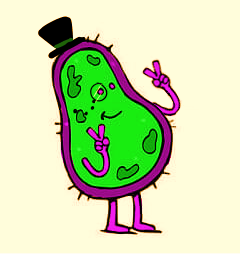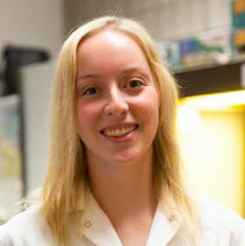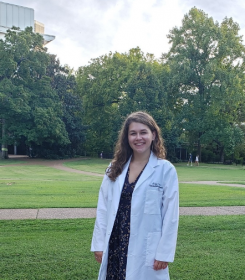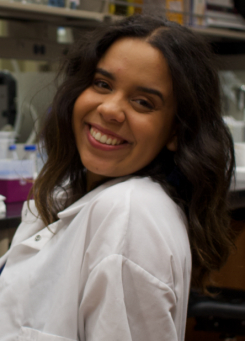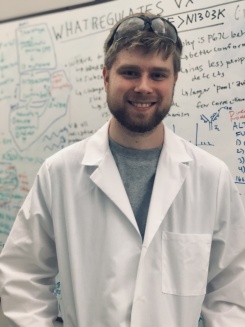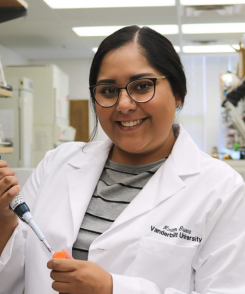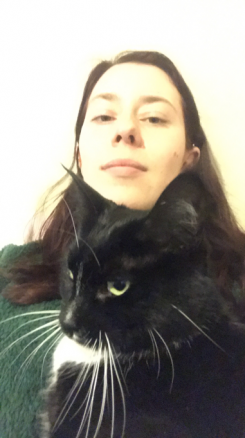We are a group of faculty and first year graduate students who are embarking on a travel expedition into the microbial world. Check this site for a description of what we learn and see along the journey. You can also follow us on Twitter! @ClassMicro
We welcome your constructive feedback!
“Staying Healthy: Hide Your Metal”
Eki
February 3, 2021
VI4 Seminar, 1/14/21, Dr. Carolyn Ibberson
KayLee Steiner
January 26, 2021
This week, I attended a seminar from the VI4 at Vanderbilt University Medical Center, which hosted Dr. Carolyn Ibberson from Georgia Institute of Technology. She is a current faculty candidate for Vanderbilt and her presentation was titled “Insights into S.
A look at disease vectors: The mosquito
Jordyn Sanner
January 25, 2021
Insects inhabit our world, acting as agricultural pollinators and pests, as well as vectors of diseases. As common disease vectors, mosquitoes have been identified as one of the deadliest organisms in the world [1]. In a recent lecture, Dr.
Turducken antibiotics
Julissa Burgos
January 24, 2021
In the podcast “This Week in Microbiology” the hosts Vincent Racaniello and Michael Schmidt discussed a scientific paper on a novel synthetic dual drug called sideromycin that is used to combat Gram-negative bacteria.
Let’s Get Our Hands Dirty
Ryan Fansler
January 16, 2021
The rise of antibiotic resistance constitutes a very real and growing global health threat. Between 2000 and 2020, only 24 new antibiotics were approved by the FDA, an alarming decrease from the 63 antibiotics approved in the preceding twenty years1. However, there is still hope for solutions to this crisis.
How Clinicians are Combatting Antibiotic Resistance with Previously Avoided Therapies
Tomas Bermudez
February 11, 2020
One of the unfortunate side effects of taking antibiotics to clear bacterial infection is its effect on the body’s microbiome. Antibiotics are generally nonselective in their targets; being put on a regimen of antibiotics can kill off an infection, but it will likely also cause harm to the beneficial bacteria of the patient (Dethlefsen et al., 2008).
The Cinnamon Challenge
Microbial_Miriam
February 9, 2020
Pseudomonas aeruginosa is a notorious opportunistic pathogen best known for causing lung infections in patients with cystic fibrosis and compromised immune systems. Interestingly, this pathogen has the capability of communicating with other bacteria via a phenomenon called quorum sensing. P. aeruginosa produces metabolites, often termed autoinducers, that accumulate during growth.
Coronavirus Susceptibility to the Antiviral Remdesivir
AlexInWonderland
February 5, 2020
Coronaviruses (CoVs) can cause significant disease in humans, as was evident in the severe acute respiratory syndrome (SARS) outbreak in 2002, the Middle Eastern respiratory syndrome (MERS) outbreak in 2012, and the ongoing outbreak in Central China of a yet to be genetically defined CoV (2). Currently, there are no approved therapeutics available, however, Agostini et al. details the effects of a nucleoside analogue that potently inhibits human and zoonotic CoVs in vitro.
TWIM: Exosomes in your nose and in your gut
microbe_mc
February 3, 2020
In the podcast “Exosomes in your nose and in your gut” in the series “This Week in Microbiology”, hosts Michael Schmidt, Michele Swanson, and Vincent Racaniello talk primarily about two recent articles (Schmidt et al., 2019). The first article focuses on the immune response in nasal epithelial cells to invading pathogens.
